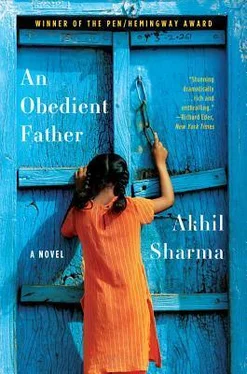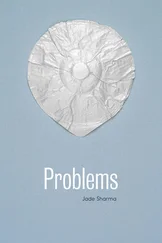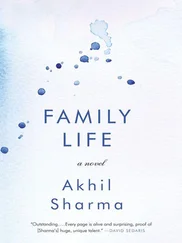"Congress has to form a coalition and win. It has to. None of the possible Congress leaders are famous enough — even Sonia Gandhi — to lead an opposition. They all need to be at the center for a while so that people get used to seeing them as the source of power and gifts."
I was delighted. I swept my hands down Mr. Maurya's leg to his foot and kneaded it. I negotiated automatically. "Congress isn't strong in the cities. They have no advantage, as in the villages."
"Would you rather watch Mr. Gupta sing and dance or Rajesh Khanna?" Mr. Maurya paused and watched me. "The reason Mr. Gupta is going to run is that if he doesn't and Congress loses seats, and the BJP takes over Delhi, which it will, he'll have corruption charges against him. Only if he wins his election is he safe."
To be given evidence that Mr. Gupta would run jolted my fears.
"It all depends on what Sonia Gandhi does."
I did not respond and kept massaging his legs.
Mr. Maurya let me know I was to leave by handing me the empty cold-drink bottles and telling me to take them downstairs. I stood and said namaste. "Ask my cashier for fifty thousand rupees. Tell Mr. Gupta I am happy for him."
After all the confusing talk, the half lakh spun me around some more, because it suggested that Mr. Maurya thought Mr. Gupta was worth betting on.
Mr. Gupta held the wads of rupees as he sat behind his desk and listened to me. Afterward he said, "Either Mr. Mau-rya thinks that I might win and that Congress isn't strong enough to be too angry about his support or he thinks that he can buy off Congress's anger by donating to Congress as well as to me." I was pleased to hear Mr. Gupta's caution. "You didn't tell him I have Congress's money?"
"No." I wondered how he could imagine Mr. Maurya would not know where the money was coming from.
"He must guess. He wants the business I can send his way."
TJ ajiv Gandhi's funeral was the next day, and the city would I ^Wbe closed, making it unlikely for me to find anyplace outside the flat where I could hide from Anita. Once I arrived at the flat I would probably stay in my room till the office opened again. Because of this, after leaving Mr. Gupta, I went to eat.
I ate at a dosa place on a street corner in Kamla Nagar, not far from the Big Circle. It was missing the two walls which should have fronted the street. The restaurant was busy and I had to share a bench and table with two boys who sat with motorcycle helmets at their feet and ate plate after plate of ice cream.
I ordered a masala dosa and, before starting to eat, clasped my hands and asked God to rescue me. I did not know what I meant by rescue. I was not requesting the strength to talk with Anita and cope with whatever came after. I only wished everything to be erased. Nothing else would be sufficient. Even though I was hungry, I found no relief in the greasy, spicy potatoes or the coconut chutney. Usually, as soon as food entered my mouth, something inside me loosened and swelled like a sail. I should have been especially hungry because, between Rajiv Gandhi's death and the office opening, I had eaten little, only the small amounts of food left in the
refrigerator overnight. Yesterday morning, as soon as I escaped the flat, I had gone to a dhaba and eaten the equivalent of a lunch and a half of parathas. But since then, even a few bites tamped my appetite. Once the fiercest part of my hunger dulled, I became too restless to continue chewing.
I stopped halfway through the dosa. It was as if my saliva was bitter. I leaned back in the bench and tried to find the humor that had been helping me till now. No absurd images floated up to my consciousness. I prayed again, but no matter how much I invoked God, I would have to go home, where Anita would look at me and not talk and Asha would stay away because she had been warned I was sick and contagious.
From the doorway of the flat, I saw Anita sitting lotus-fashion on a love seat in the living room. She had on her rectangular eyeglasses and was reading a newspaper. When I entered the flat, she looked at me briefly and, turning to an Asha whom I could not see, squeaked "Stay" in the pinched voice which had been with her since she had confronted me.
I crossed their bedroom and entered the living room. I was terror-stricken. I had not spoken a word to Anita since the afternoon of the anniversary of Radha's death. I had tried to avoid even seeing them. The last two days I had bathed and shaved long before either woke, and had left for work quickly, with my head down. Now Asha was on the sofa reading a children's magazine. She wore olive shorts and a white T-shirt. As I left the living room for my room, Asha waved at me as if I were going on a journey. I fluttered a hand. Anita neither glanced in my direction nor spoke, but she watched Asha intently.
I went into my room. I noticed that under my cot was a small clay water pot and the glass I usually drank from. Anita must have put them there. I won't even have to come out for water now, I thought. I closed the door, chained it, took off my clothes, and, wanting to express my anguish somehow, dropped them to the floor
instead of hanging them up. I lay down. My fear settled and transformed into despair.
I listened to music on a transistor radio. I slept. The line of sun beneath my door changed colors and receded. I read from old magazines I had collected for photos they contained of places I had been. The Taj Mahal under a full moon, standing out clear and bright as if it had been painted onto the night. It looked more a ghost than those the guards claim to see dancing in the gardens. I heard Asha and Anita eating dinner in the common room. To listen to the sounds of plates and bowls shifting, spoons rubbing against steel, Anita's high-pitched voice meeting Asha's and to lie on my cot in my dark room made me feel buried alive.
In the middle of the night, once Anita and Asha were asleep, I left my room and went onto the balcony. Dust was a lid for the city's lights and made the sky's gradual curve clear. I stood there for nearly an hour. The squatter colony was silent, except when someone got up and creaked the hand pump for a drink of water.
I thought of admitting everything to Anita and begging forgiveness. But I felt no more capable of honesty now than when I had shut the windows to keep the neighbors from hearing her screams. I also believed that Anita was no longer willing to exchange confession for pardon. I thought this because Anita had begun telling Asha numerous lies which appeared unnecessarily extreme, and this implied indifference to the future. Anita had told Asha I was sick and that the sickness had come about because of sinful things I had done. Anita claimed her squeak was caused by my disease and that she did not know if she would ever improve. She also informed the child that I was disgusted with Asha because she was a burden on me. I had heard all these things over the last few days because Anita said them in the common room, intending, I understood, for me to hear.
I stayed on the balcony for hours. At maybe two or three in the morning, far away in the dark, a box kite with a burning candle inside rose and hovered. It was pulled down near dawn, and then I went back to my room.
In the morning I listened to Rajiv Gandhi's funeral on my radio.
There was a biography of the Nehru family and then one of Rajiv Gandhi. Friends of Rajiv Gandhi and important politicians like Nelson Mandela were interviewed. There was a long period when the commentator merely described who was passing through Rajiv Gandhi's residence on Janpath and stopping and praying before the mound of flowers that buried his casket. Anita and Asha listened to something similar on the television. They periodically left the living room, but the television stayed on, as if it were a prayer lamp which, even after the prayer is over, must be allowed to burn itself out.
Читать дальше












